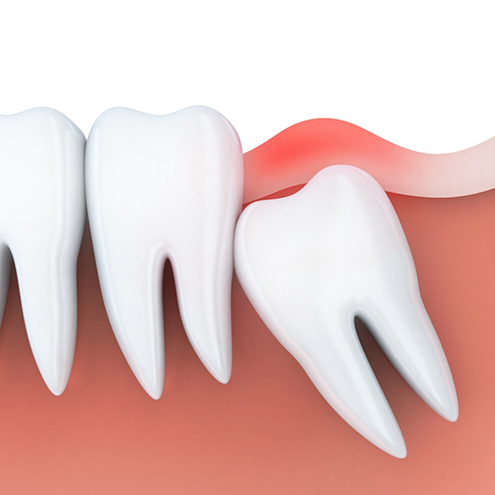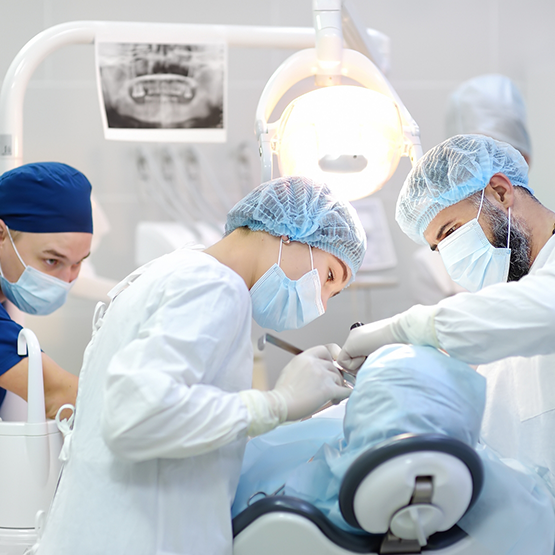Are you familiar with those pesky teeth that seem to appear out of nowhere during your late teens or early twenties? Yes, we're talking about wisdom teeth! These third molars can often cause more harm than good, leading to a common dental procedure known as wisdom tooth extractions. If you're wondering what this procedure entails, our team can help. Simply call our dental office to schedule a complimentary consultation for wisdom tooth extractions in Reno.
Why Choose Smile Design Implant Centers for Wisdom Tooth Extractions?
- Experienced Oral Surgeon On-Staff
- Pressure-Free Complimentary Consultations
- Numerous Financing Options Available
What Are Wisdom Teeth?
Wisdom teeth, also known as third molars, are the last set of teeth to emerge in your mouth. They typically make their appearance between the ages of 17 and 25, hence the name "wisdom" teeth. While some lucky individuals experience no issues with these extra teeth, for many people, wisdom teeth can be a source of trouble.
Unlike our ancestors who needed wisdom teeth to chew tough foods like roots and raw meat, modern humans have smaller jaws that may not have enough space to accommodate these additional molars. This lack of space often leads to impacted or partially erupted wisdom teeth.
Impacted wisdom teeth occur when they become trapped beneath the gum line or against neighboring teeth due to limited room for proper eruption. Partially erupted wisdom teeth can create pockets around them where bacteria can thrive, leading to infections and other dental problems.
These problematic situations caused by overcrowding or improper alignment are precisely why many dentists recommend having your wisdom teeth removed before complications arise. By proactively addressing potential issues early on through extraction, you can save yourself from future pain and discomfort!
The Purpose of Wisdom Teeth Removal
Wisdom teeth, also known as third molars, are the last set of teeth to emerge in our mouths. However, more often than not, these late bloomers can cause a host of problems and discomfort. That's where wisdom teeth removal comes into play.
One of the main reasons for removing wisdom teeth is because they frequently become impacted. This means that there isn't enough space for them to properly grow and develop. As a result, they may grow at an angle or only partially emerge from the gum line. This can lead to pain, swelling, infection, and damage to surrounding teeth.
Another purpose of wisdom tooth removal in Reno is preventive care. Even if your wisdom teeth haven't caused any issues yet, removing them proactively can help prevent future complications down the road. By eliminating potential problems before they arise, you can save yourself from unnecessary pain and dental procedures later on.
Additionally, extracting problematic wisdom teeth can improve overall oral health and hygiene. When overcrowded or impacted wisdom teeth are removed in a timely manner by a skilled professional, it reduces the risk of developing cavities or gum disease around these hard-to-reach areas.
When Is the Best Time to Remove Wisdom Teeth?
When it comes to wisdom teeth removal, timing is everything. But when exactly is the best time to have them extracted? The answer may vary depending on everyone’s unique circumstances.
In general, it is recommended to remove wisdom teeth during the late teenage years or early adulthood. This is because, at this age, the roots of the wisdom teeth are not fully developed yet, making extraction easier and less complicated.
However, every person's situation is different. Some individuals may experience no problems with their wisdom teeth and can go through life without needing them removed. Others may start experiencing pain or discomfort as their wisdom teeth begin to emerge.
If you're unsure whether your wisdom teeth need to be extracted, it's essential to consult with a dental professional who can evaluate your specific case. They will consider factors such as overcrowding, impaction, and potential damage to neighboring teeth before recommending extraction.
How Are Wisdom Tooth Extractions Performed?
Wisdom tooth removal in Reno is a common dental procedure to prevent potential problems caused by the eruption of these third molars. The process begins with a thorough examination and assessment by your dentist or oral surgeon.
To ensure your comfort during the procedure, local anesthesia or sedation may be administered. Once you're numb or relaxed, the dentist will carefully extract the impacted wisdom teeth. If necessary, an incision may be made in the gum tissue to access the tooth.
In some cases, wisdom teeth are deeply embedded in the jawbone and require extraction by sectioning them into smaller pieces for easier removal. This technique minimizes trauma to surrounding tissues.
After removing all affected teeth, any incisions are stitched closed using dissolvable sutures that eliminate the need for manual removal later on. Gauze pads are placed over extraction sites to control bleeding and promote blood clot formation.
The entire process of wisdom tooth removal in Reno usually takes about 45 minutes per tooth but can vary depending on complexity and individual factors. Your dentist will provide post-operative instructions regarding pain management, swelling reduction techniques, diet restrictions, and proper oral hygiene practices.
Recovery After Wisdom Tooth Extractions
Once the procedure is complete, it's important to take proper care of yourself to ensure a smooth and speedy recovery.
Immediately following the surgery, you will experience some swelling and discomfort in the area. This is completely normal and can be managed with over-the-counter pain medication recommended by your dentist or oral surgeon. Applying an ice pack to your face for short intervals can also help reduce swelling.
During the first few days, it's essential to stick to a soft food diet that won't irritate the extraction site. This includes soups, yogurt, mashed potatoes, and smoothies. Avoid chewing on hard or crunchy foods as they may cause damage or dislodge any blood clots that have formed.
It's important to keep your mouth clean during this time, but be gentle when brushing near the extraction site. Your dentist may recommend using an antiseptic mouthwash or saltwater rinse to help prevent infection.
In terms of physical activity, it's best to avoid any strenuous exercise for at least 24-48 hours after surgery. Physical exertion can increase bleeding and slow down healing.
Every person's recovery process may vary slightly depending on their individual circumstances. It's essential to follow all post-operative instructions provided by your dental professional for optimal healing.





